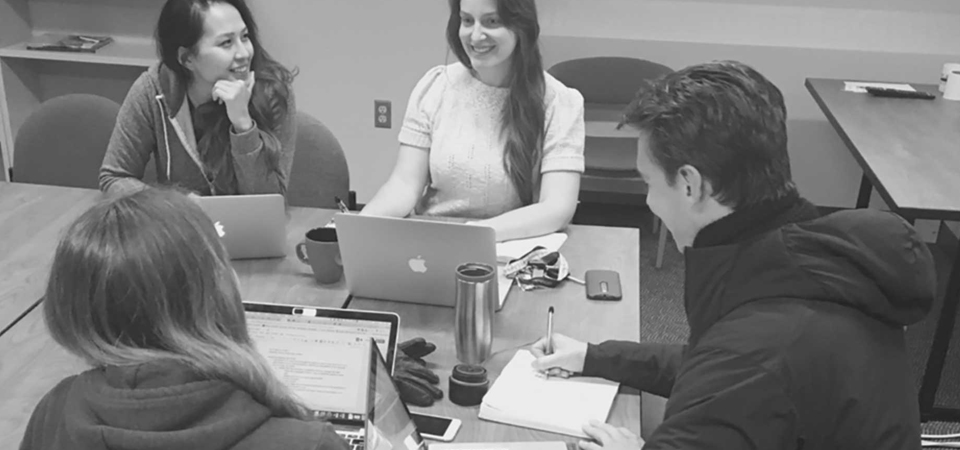Emily Duncan and Andrew Nixon are Food From Thought Research Assistants with Food From Thought, and Katya Kudashinka and Nasrin Husseini are Arrell Scholars.
FeedBack is a blog of reflections by the 2017 AFI-FFT Grad Cohort on their experiences so far in the program.
We are a group of graduate students working with Food from Thought and the Arrell Food Institute to create innovative solutions that will transform the global food system. The four of us gravitated towards the issue of the use of big data in agriculture. With the advances in new technologies, such as drones, sensors, and robotics, digital agricultural devices are now gathering mass amounts of data. With this digital revolution comes challenges in data governance, building data infrastructure, and providing support to farmers to effectively use these tools. To address this challenge, our team comes from various academic and experiential backgrounds offering a unique perspective to understanding big data and agriculture.
Emily is currently pursuing a M.A. in Geography within the College of Social and Applied Human Sciences. Her current research focuses on the social consequences of precision agriculture, particularly focusing on understanding changes to the relationship between technology retailers and farmers due to the introduction of data-gathering technologies. As a human geographer, her approach to big data in agriculture focuses on understanding how new approaches to farming can be introduced in an equitable and sustainable manner.
After graduating from the University of Guelph in 2014 with a degree in Leadership and Organizational management, Andrew has spent the last three years as a consultant working to improve local food networks and address sustainability issues in the tree fruit and nut industry, working with large multinational companies that share these same values, such as Ferrero. He is now entering his first year of a Masters of Arts in Management within the College of Business and Economics. His research will focus on enabling managers to more efficiently and effectively diffuse new crops into the food system.
Katya was raised on a farm in Siberia, Russia, studied engineering in Saint-Petersburg, and moved to Canada ten years ago where she completed a degree in computer science, then an MBA at the University of Toronto. Her vision is to participate in a new future for agriculture that employs advanced data science to enhance crop yields and increase food production productivity for humankind. Two years ago Katya founded UDIO AgTech, a Canadian startup that applies machine learning to optimize irrigation on farms. Prior to UDIO, she gained six years of industry experience at IBM and the CPP Investment Board. Katya is now focused on advancing her skills in the application of machine learning through a Ph.D. in the School of Engineering.
Nasrin finished her DVM program in Kabul, Afghanistan. During that time, it was a great challenge for women to study after Taliban period; however she graduated on the top of her class. She moved to Canada five years ago and after working in veterinary field, she started her master’s program at the University of Guelph. Nasrin’s research is focused on studying the resilience of high immune responder beef cattle in context of climate change, and being part of the big data group, she believes that creating a connection between farmers, industry, researchers, and other relevant sections will help transfer knowledge and innovations, and optimize usage of the big data which is already available.
Given that the issue of big data in agriculture is multi-faceted, we strongly believe that our interdisciplinary team is well positioned to deal with these issues, from the technical elements of digital tool design, to understanding various agricultural elements, to asking the social questions of governance of data. Working together with students outside our departments has been an enriching academic experience, where we are learning new project management strategies, effectively communicating from our own disciplines, and we think that there should be more initiatives like this on campus for both graduate and undergraduate students. This initiative allows us to take our ideas on the data issues project back to the wider group of Arrell Scholars and Research Assistants, as well as the experienced and knowledgeable facilitators of this initiative, to get more diverse perspectives and insights from the wide range of expertise. The global food system connects us all as we all have to eat, therefore, interdisciplinary research is a necessity to solve the complex issues facing us, and we are excited to be a part of a project like this through the Arrell Food Institute.


